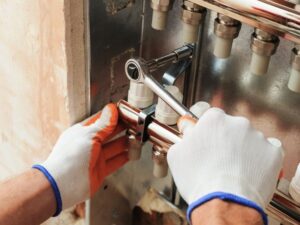How a Whole-Home Dehumidifier Benefits Your Home
While not nearly as humid as coastal areas further to the south, summers still get quite muggy around Chattanooga, TN. More than an inconvenience, uncontrolled humidity can strain your AC system and raise your cooling expenses while leaving you uncomfortable. Discover how humidity impacts temperature and how a whole-home dehumidifier improves your comfort and reduces your energy costs.
How Humidity and Temperature Work
We all know heat and humidity go hand in hand, but understanding why helps you make your home more comfortable. Humidity refers to the amount of moisture in the air. The relative humidity is the amount of moisture in the air compared to how much dampness the air can hold.
The warmer the air, the more moisture it can hold. This is why the same relative humidity reading feels muggier when the air is warmer. Conversely, at the same temperature, the air feels warmer and stickier with a higher humidity reading.
Controlled Humidity Reduces Energy Consumption
The temperature setting on your home’s thermostat is usually used as a gauge for comfort. Given a particular temperature setting, you can expect to feel a certain way in your home. However, if your home doesn’t feel comfortable, you may adjust your thermostat a couple of degrees.
Believe it or not, the temperature setting is really important when it comes to managing your utility bills. The greater the difference between the temperature you set the thermostat and the temperature outside, the more energy you consume.
That means that when you aren’t comfortable at a temperature like 72 degrees because it’s muggy, your energy consumption jumps. When you reduce your humidity level, you’ll feel more comfortable at higher temperatures. Not only does this avoid lowering your temperature, but it allows you to keep it higher and still feel comfortable.
Improve Air Quality With Proper Humidity Levels
Humidity has a direct effect on air quality, which is the volume of contaminants in the air. Too little humidity is as problematic as too much humidity in your home.
When the air is too dry, airborne contaminants aren’t as heavy and stay in the air longer. This usually isn’t a problem in the Chattanooga area over the summer.
On the other end of the spectrum, too much humidity encourages biological spores to grow and proliferate in your home’s air. These exacerbate the discomfort felt by anyone with allergies, leading to more difficulty breathing, itchy eyes and more. The EPA suggests that the ideal indoor humidity to control air quality is between 30% and 50% relative.
Appropriate Humidity Reduces HVAC Strain
Not only does controlling your humidity help reduce your energy consumption, but it also reduces your heating and AC repairs. Maintaining the proper humidity reduces the number of contaminants that’ll get caught in the system.
These contaminants collect on your air filter and in your system, restricting the air moving through it. Restricted airflow makes the system run longer heating and cooling cycles, which increases the system’s wear.
Why Choose a Whole-Home Dehumidifier?
When it comes to dehumidifying your home, you have three options generally available. You can use your air conditioner, use smaller standalone dehumidifiers or install one as part of your HVAC system.
Using your air conditioner as a dehumidifier is a losing proposition. To draw enough moisture from the air to make a substantive difference, you’d have to run your AC system uncomfortably cold. Running your air conditioner in this manner is generally cost prohibitive, especially with climbing energy costs.
Smaller floor units can work really well for single problematic rooms, such as the bathroom or kitchen. The problem with using these to try to dehumidify your entire home is getting enough circulation. They tend to control the immediate area around the unit while other rooms remain too humid.
The ideal option is to install a whole-house dehumidifier as part of your HVAC unit. This lowers the humidity as air flows toward your evaporator coil, reducing the work your AC system has to do. The system then circulates that dehumidified air throughout your entire home, more evenly decreasing the moisture content in your home.
Don’t let uncontrolled humidity take a bite out of your wallet and ruin your time at home. Call to schedule your consultation with one of the indoor air quality experts at Dalton Heating & Air today.
Image provided by iStock
You May Also Like

Does My Heat Pump in Rocky Face, GA, Need Repair?
Rocky Face, GA, homeowners find comfort in the gentle hum of their heat pumps. But when that familiar hum turns into a… Continue Reading Does My Heat Pump in Rocky Face, GA, Need Repair?…

Reasons to Schedule a Furnace Inspection Before Heating Season
As autumn settles over Chattanooga, TN, you’ll start using your heating system to stay warm inside your house. If you use a… Continue Reading Reasons to Schedule a Furnace Inspection Before Heating Season…

Save Money With Our HVAC Maintenance Agreement Membership
Chatsworth, GA, homeowners are starting to prepare for the heating season. One of the smartest ways to stay comfortable while saving money… Continue Reading Save Money With Our HVAC Maintenance Agreement Membership…
